2024 SDG 12 English
- 12.2.1 Ethical sourcing policy
- 12.2.3 Policy waste disposal – hazardous materials
- 12.2.4 Policy waste disposal – landfill policy
- 12.2.5 Policy for minimisation of plastic use
- 12.2.6 Policy for minimisation of disposable items
- 12.2.7 Disposable policy: extensions to services
- 12.2.8 Minimisation policies extended to suppliers
- 12.3.1 Waste tracking
- 12.3.2 Proportion of waste recycled
- 12.4.1 Publication of a sustainability report
12.2.1 Ethical sourcing policy
1. Ethical Purchasing of Supplies
Following the Ministry of the Environment’s “Green Purchasing Performance Assessment Methodology” the NTNU has formulated a detailed “Green Purchasing Implementation, Target Execution Rate Control and Reporting Procedure” to promote ethical purchasing of supplies and encourage our colleagues to give priority to choosing products with the environmental protection label. At the same time, the university regularly reports its green purchasing achievements. In the past three years, the NTNU has achieved an outstanding performance rate of 99.92%, 99.93%, and 99.91% respectively for designated green procurement items. This reflects the university’s efforts in active publicity and promotion of the Green Living Information Network.
2. Ethical Food Purchasing
The Health Center is responsible for promoting meal management and nutrition education, has a Dietary Hygiene Coordinating Committee, and has established a campus food ingredient tracking system. The Dietary Hygiene Coordinating Committee is responsible for counseling each food service department in recruiting contractors to ensure that the contract includes relevant clauses and standards that comply with ethical purchasing policies. According to the agreement between the university and outsourced restaurants, “priority should be given to the use of a traceability system of agricultural products”. Examples of these are TAP(Traceable Agricultural Product), CAS(Certified Agricultural Standards), and GAP(Good Agricultural Practice).
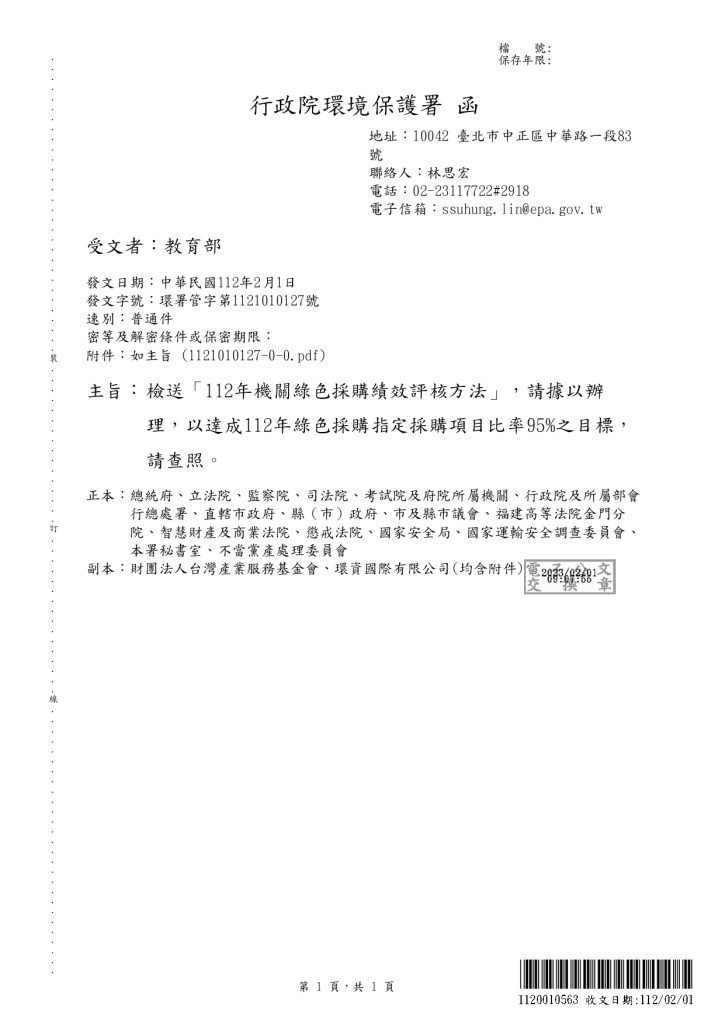
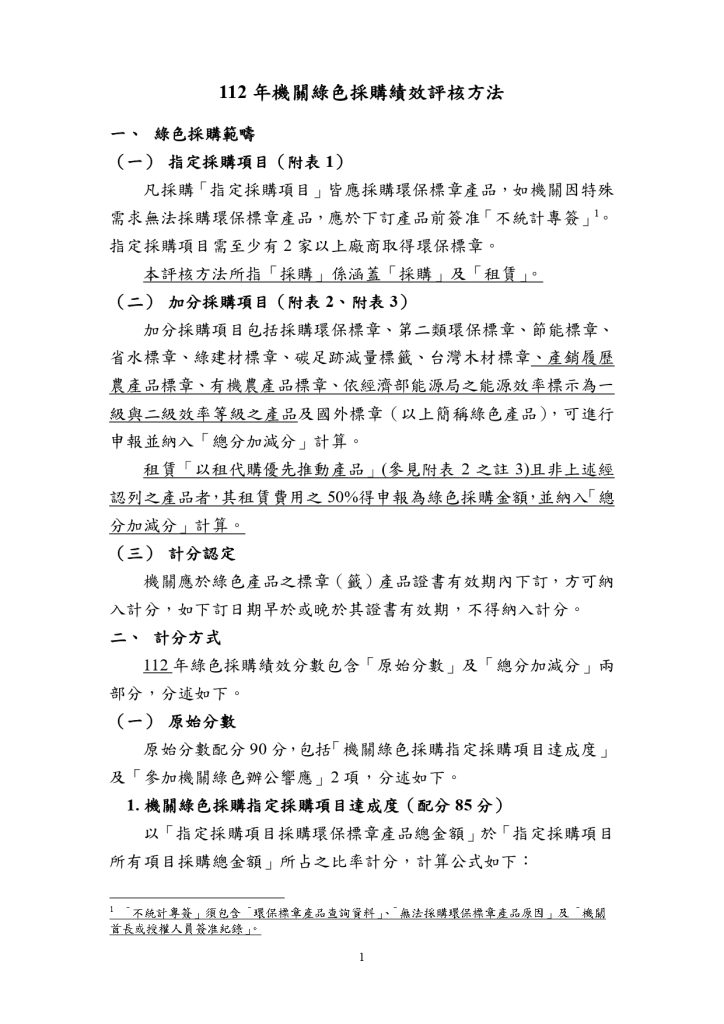
Ministry of the Environment “112 Agency Green Purchasing Performance Assessment Methodology”
12.2.3 Policy waste disposal - hazardous materials
1. Hazardous Waste Policy:
The Environmental Safety and Health Center has been set up to take charge of the safety and health of the laboratories. There are clear principles for the management of hazardous waste in the laboratories, from the classification, storage, and labeling of toxic waste, to the maintenance and management of the hazardous waste storage site, as well as the outsourcing of the removal of the hazardous waste, and the promotion and reporting of the process, all of which are following the Environmental Protection Agency Waste Cleanup Laws and Regulations, to ensure that the toxic wastes are properly cleared.
- Laboratory Hazardous Waste Management Policy: Includes requirements for classification, labeling, storage, and removal of hazardous substances, emphasizing responsible handling of hazardous business waste to minimize environmental risks.
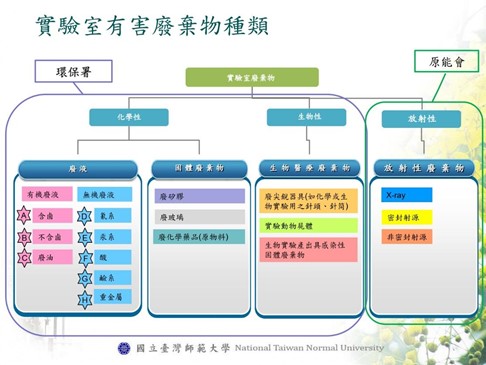
- Outsourced Removal: The removal of hazardous waste is outsourced to qualified vendors to ensure that the waste is handled following relevant laws and regulations. The frequency of removal depends on the type of waste and the needs of the campus.
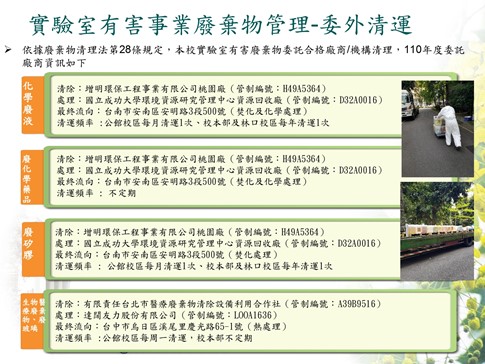
- Radioactive Waste Management and Environmental Protection Act Compliance: Comply with the requirements of the Radioactive Materials Management Act of the Atomic Energy Commission of the Executive Yuan to ensure that the permanent decommissioning, registration, and disposal of these wastes comply with the legal requirements to minimize any possible radiation risk.
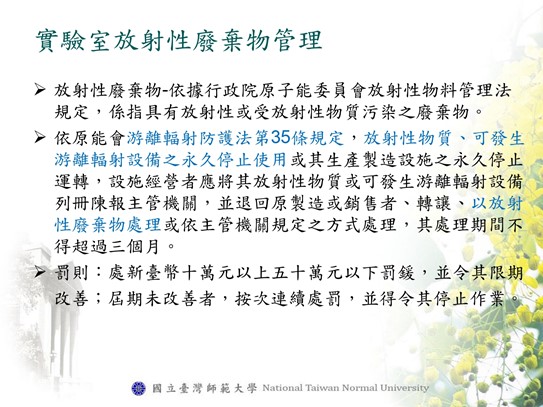
- Outreach and Education Training and Reporting: Through laboratory visits and personnel education training, ensure that laboratory members are aware of hazardous business waste management policies and procedures and provide guidance to ensure proper waste handling.
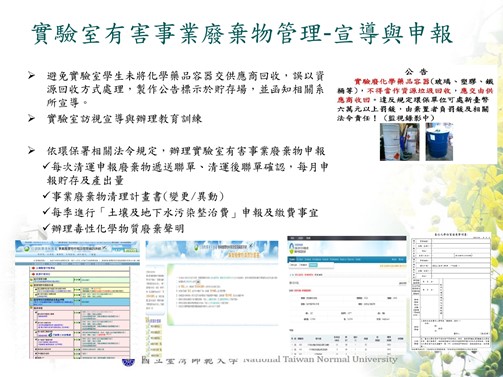
2. Hazardous waste research
Our faculty and students are also actively involved in research in the field of hazardous waste recycling and treatment, covering a wide range of issues such as policy formulation, system design, and its impact on the biological environment, which has far-reaching implications for the protection of natural resources. Relevant research includes, “Enablers for Adopting Restriction of Hazardous Substances Directives by Electronic Manufacturing Service Providers”, “Toxic effects of polystyrene nanoparticles on the development, escape locomotion, and lateral-line sensory function of zebrafish embryos”.
12.2.4 Policy waste disposal - landfill policy
The university commissions qualified operators to assist in the removal of waste to legal landfills or incinerators under the “Waste Disposal Act” and the “Regulations on the Licensing of Citizen-run Waste Removal and Disposal Organizations” and other relevant laws and regulations. Formulate the work specifications for “Waste (including large waste) removal and food waste recycling at the Heping and Gongguan Campus.”
Recycling containers are set up in each unit according to the classification of general garbage, paper, metal cans, and plastic bottles to cultivate the habit of proper garbage classification among teachers and students.
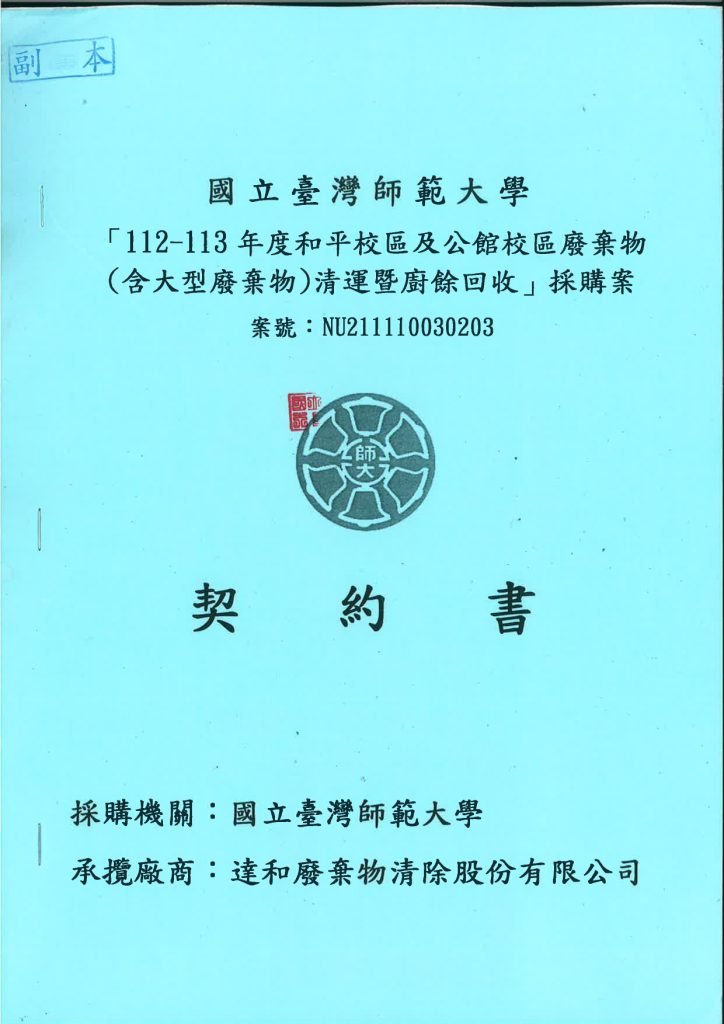
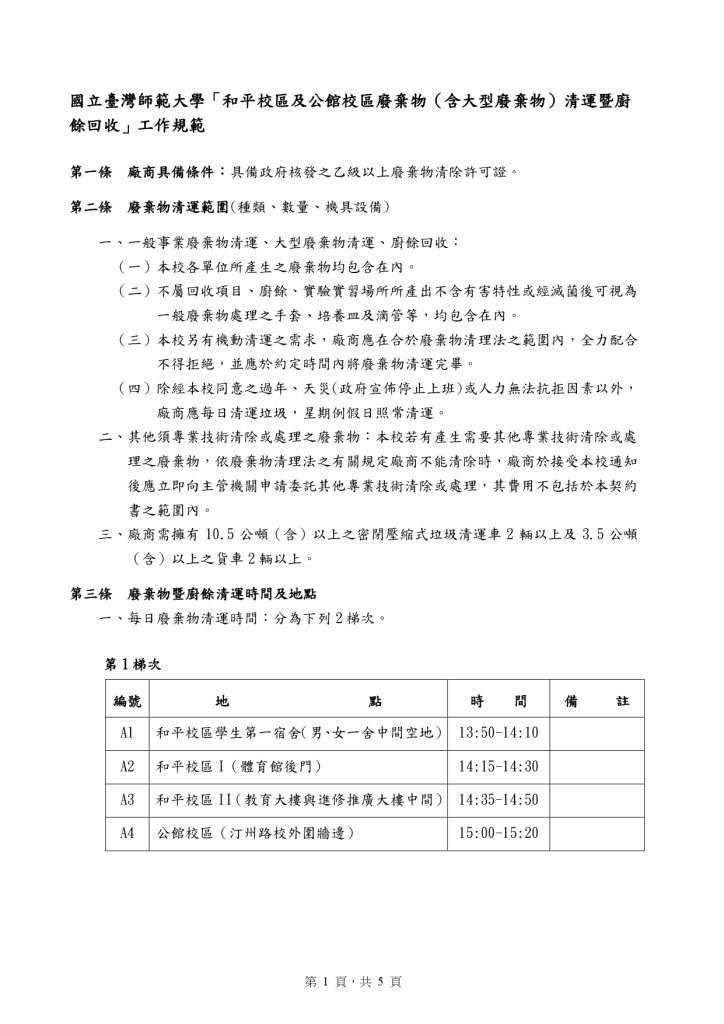
NTNU “Waste (including large waste) Removal and Food Waste Recycling at the Heping and Gongguan Campus” Contract and Work Specifications
12.2.5 Policy for minimisation of plastic use
1. Policy formulation and promotion
To promote the sustainable development of the campus, the university has established the “NTNU Campus Plastic Reduction Policy”, which aims to limit or reduce the use of plastic and disposable items. This policy applies to all meetings and office activities on campus and requires strict compliance by all departments.
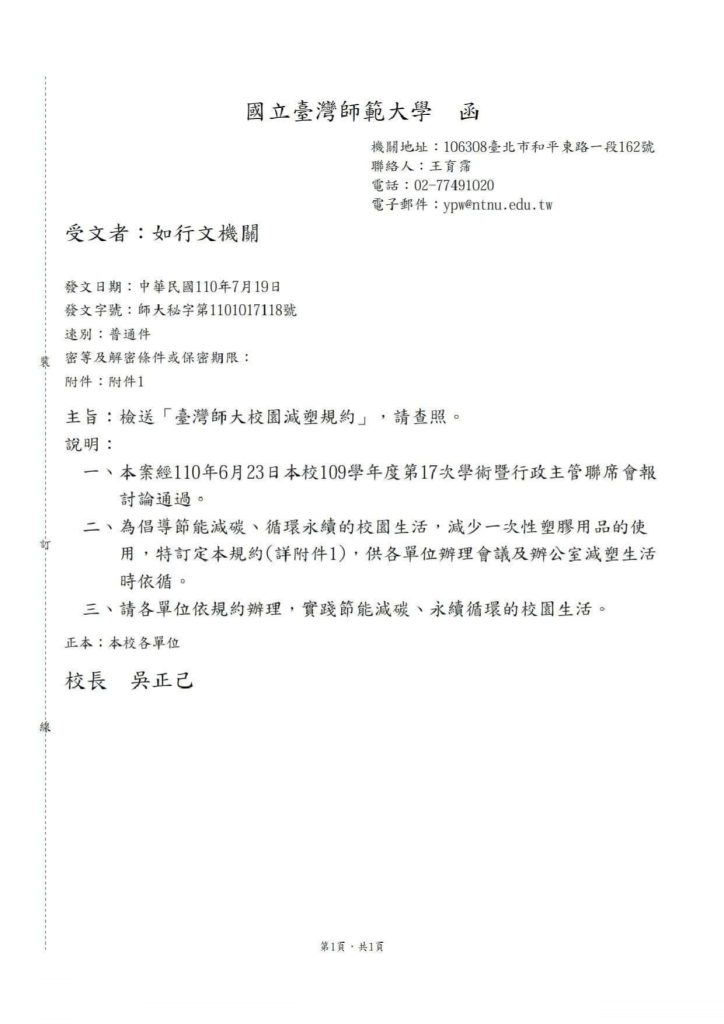
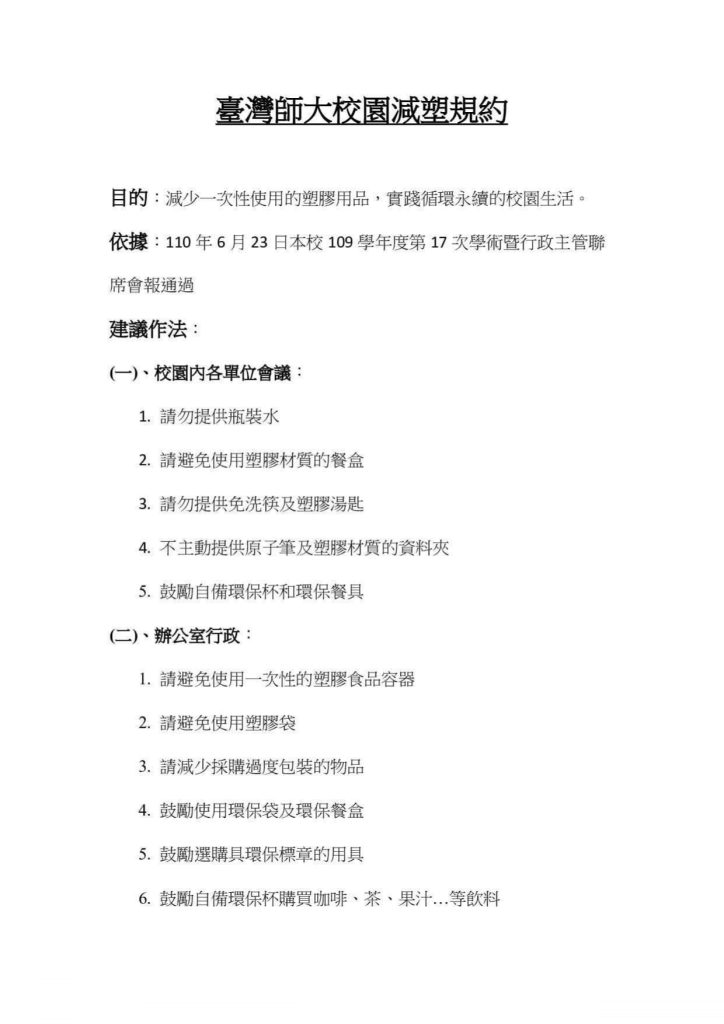
NTNU Campus Plastic Reduction Policy
2. Plastic Reduction Courses and Promotion
The “Plastic Reduction Promotion Center” aims to reduce plastic waste through action plans, including using Facebook and podcasts for educational outreach and offering courses to guide students in learning and practicing plastic reduction.
Starting in 2019, the university joined hands with Fubon Life to promote the Plastic Reduction Program and Plastic Reduction Education, including cooperating with a sustainable community, offering second-hand recycling courses, promoting the Taiwan Normal University Business District to become a Plastic Reduction and environmentally friendly Business District, organizing board games, creative competitions, and recording Podcasts for online education programs, etc., to awaken the public’s awareness of the “Plastic Reduction” of the environmental protection.
The Plastic Reduction Promotion Center organized the “I do. I don’t Plasticize! This is the seventh year of the campaign. In addition to the growing maturity of the related plastic reduction promotional activities, it is expected that more members of the public will join in plastic reduction, and more teaching tools will be developed to cultivate more on the earth.
3. Plastic Reduction Courses
In the 2023 school year, the number of students enrolled in courses related to plastic reduction and the total number of students enrolled in these courses is 160, and the enrollment status is as follows:
Course Title | Course Attributes | Course Enrollment | Semester Offered |
Family Resources & Management | Freshman / Required Course | 34. | 111-1 Sem. |
Consumer Behavior & Education | Sophomore / Required Course | 41. | 111-1 Sem. |
Sustainable Consumer Behavior Study | Master’s Student / Elective Course | 6. | 111-1 Sem. |
Consumer Behavior & Education | Second Major Program / Required Course | 30. | 111-1 Sem. |
Family Resources & Management | Freshman / Required Course | 37. | 111-2 Sem. |
Service Learning Primer | Freshman / Elective Course | 12. | 111-2 Sem. |
4. Sustainable Consumer Communities
The university has been actively building and operating plastic reduction and sustainable consumption communities since 2017, covering a wide range of communities including faculty, staff, business, community, and students, with a total of 14:
- Staff communities: including the Taiwan Normal University Teachers’ Community, the Plastic Reduction Alliance, the Home Economics Center, the Eco Board Game Community, and the Fook Woo Junior High School.
- Corporate Community: Collaborate with corporations or non-governmental organizations (NGOs) to promote plastic reduction or sustainable consumption, including Gusho Community, Compassionate Agriculture Foundation, Sustainable Food, Renzhou Net Plastic, Gradient Plants, Sinopec, and other groups.
- Student community: includes groups such as the NTNU Students’ Union, Podcasts, and board game clubs.
12.2.6 Policy for minimisation of disposable items
In order to promote the policy of reducing waste at the source, The university formulated the “NTNU Campus Plastic Reduction Policy” in 2021. On May 10, 2022, “Reduction of the Use of Washable Utensils and Packaged Drinking Water” was formulated. Establish the environmental concepts of “bring your own, repeat, and use less” among the faculty, staff, and students, and to reduce the use of disposable products such as washable utensils and packaged drinking water, etc. Applicable units are meetings, training, and events hosted by administrative units and those organized by external units that rent out the venues.
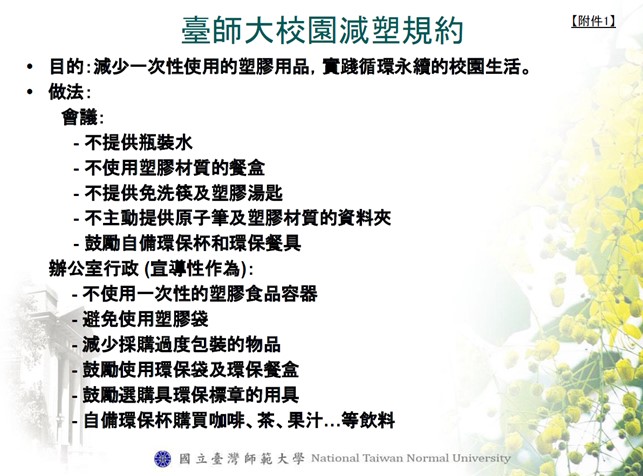
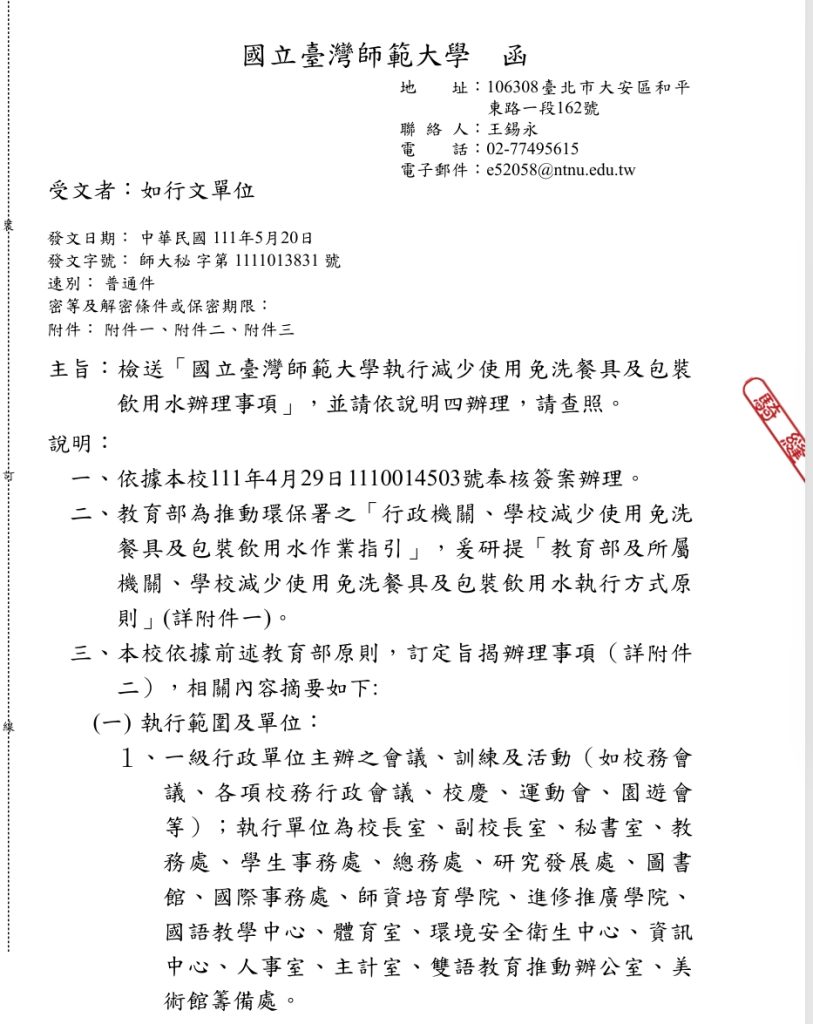
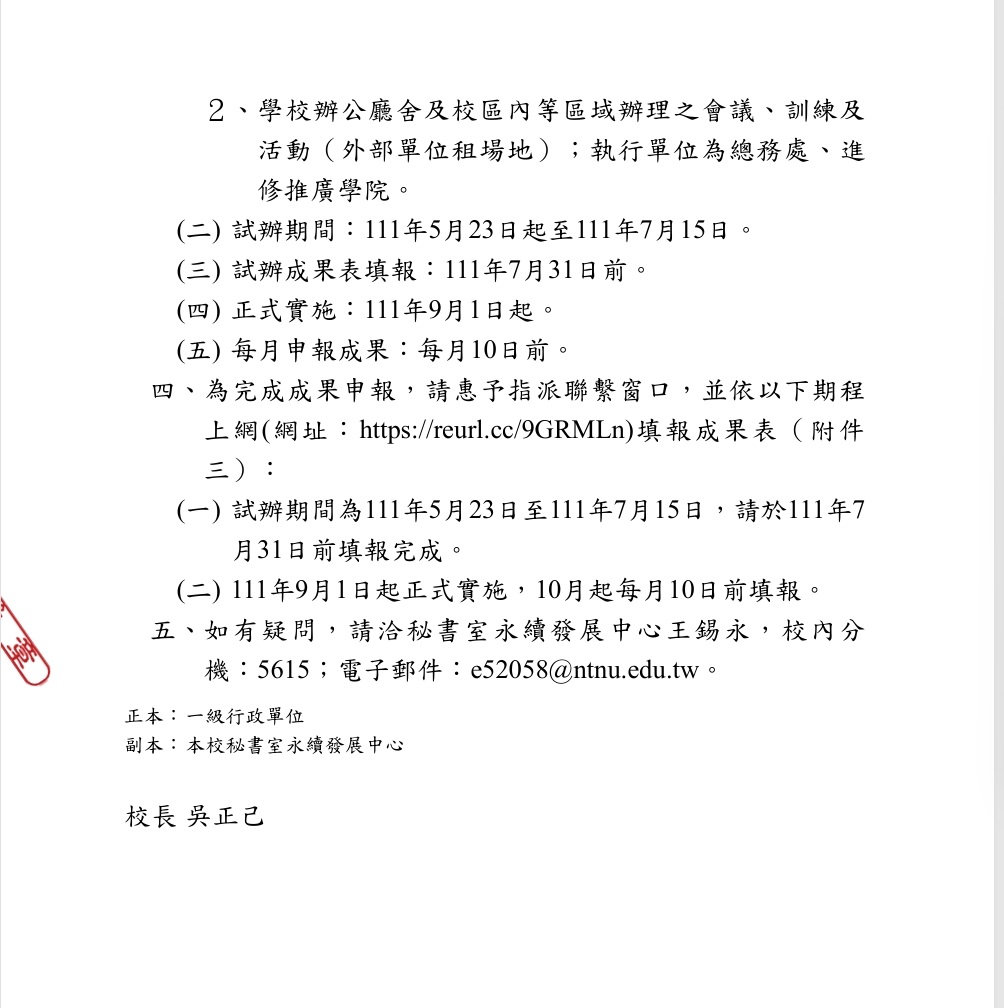
NTNU Reduction of the Use of Washable Utensils and Packaged Drinking Water
12.2.7 Disposable policy: extensions to services
The school’s 2016 Catering Committee meeting resolved to fully implement the relevant measures of “prohibiting the provision of free disposable chopsticks and spoons”, and stipulated in the student restaurant outsourcing contract that manufacturers should comply with the “Restricted Use of Disposable Tableware” announced by the Environmental Protection Agency and implementation methods”.
In the student cafeteria’s outsourced operation contract, the contractor must follow the “Restricted Usage Targets and Implementation Methods of Free Washable Utensils” announced by the Environmental Protection Department. Convenience stores cooperating on campus also no longer provide disposable tableware, and fully implement the policy of “Prohibition of Free Provision of Disposable Tableware by Businesses on Campus.”
Related link: 2023 Dietary Hygiene Coordinating Committee Records
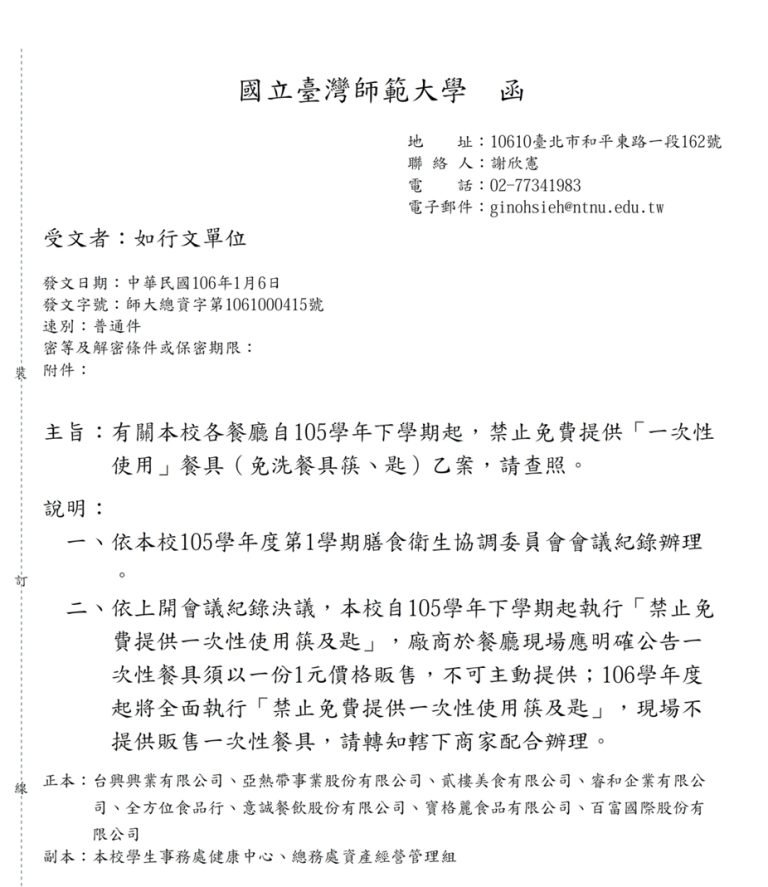
12.2.8 Minimisation policies extended to suppliers
To ensure the full implementation of the usage reduction policy, the NTNU has fully implemented the relevant measure of “Prohibition of free offer single-use chopsticks and spoons”, which helps to reduce the use of single-use products and has explicitly stipulated in the outsourcing operation contract of student cafeterias that the vendors should implement this policy following “Target Users and Implementation of Restrictions on No-wash tableware” announced by the Environmental Protection Administration so that the university and contractors can jointly promote the goals of resource conservation and sustainable development. The goal is to promote resource conservation and sustainability.
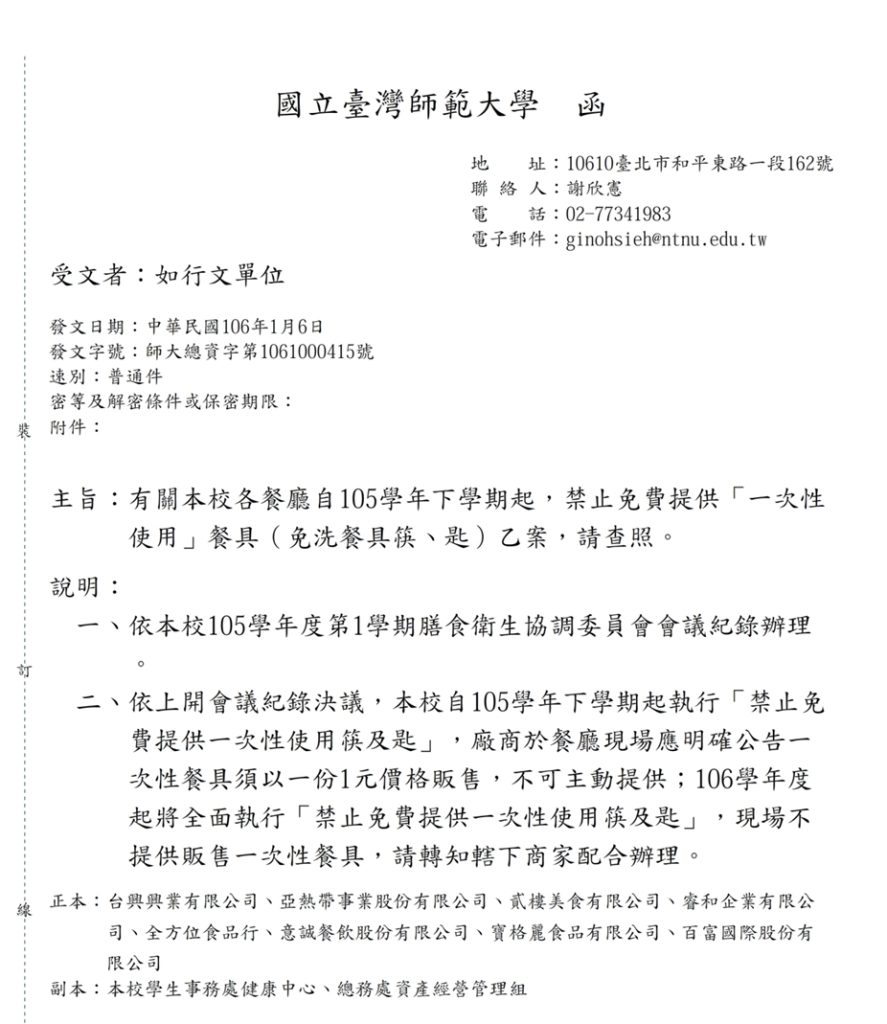
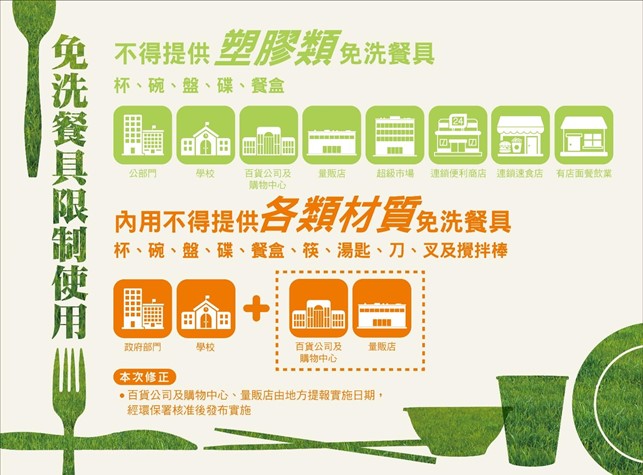
12.3.1 Waste tracking
The University commissions qualified operators to assist in the removal, measurement, and recycling of general waste and stipulate in the commission contract that it should abide by relevant laws and regulations, such as the Waste Disposal Act, “Permit Management Regulations for Public or Private Waste Clearance and Disposal Organizations,” etc. The waste shall be transported to legal landfills or incinerators for disposal.

The university’s general waste and recycling weight information is listed below:
Amount of waste generated | 1021 m.t |
Amount of waste recycled | 184 m.t |
Amount of waste sent to landfill | 837 m.t |
12.3.2 Proportion of waste recycled
The proportion of waste is 82% for general garbage and 18% for recycling. Recycling containers have been set up in each unit according to the classification of general garbage/paper/metal cans/plastic bottles to cultivate the habit of proper garbage classification among teachers and students.
- Amount of waste generated
The total amount of waste generated by our university in 2023 was 1,021 metric tons.
- Amount of waste recycle
The total amount of waste recycled by our university in 2023 was 184 metric tons.
- Amount of waste sent to landfill
The total amount of waste recycled by our university in 2023 was 837 metric tons.
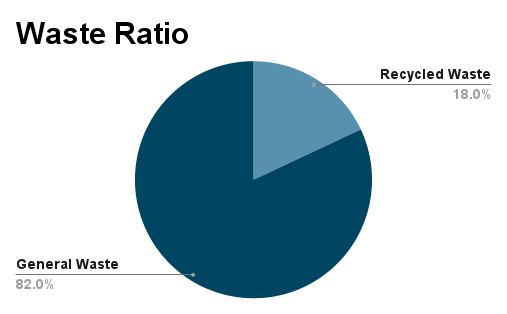
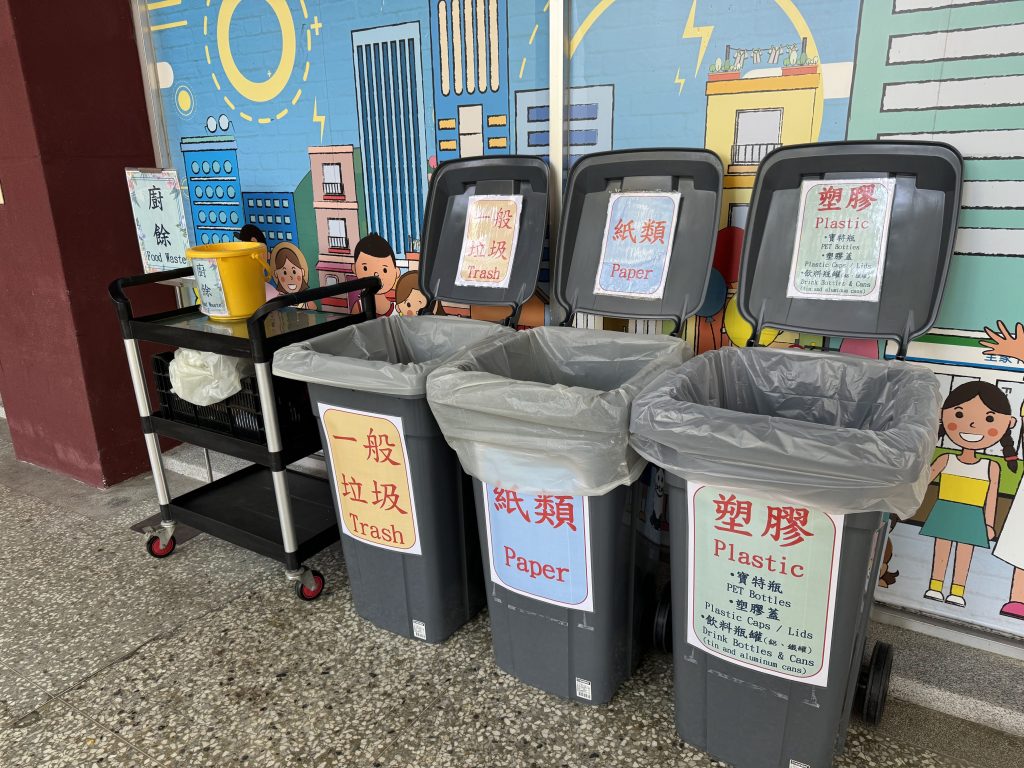
12.4.1 Publication of a sustainability report
Starting from 2021, the university published an annual report on sustainable development, revealing its vision, implementation strategies, and achievements in the four areas of “Academic Research”, “Curriculum and Learning”, “Governance” and “Community Engagement”, which will be made available to the public on the university website. The 17 SDGs categorize the 2024 Report on Sustainable Development and present each institute’s SDG initiatives.
In addition, the university has been actively promoting various activities to enhance the public’s understanding of and appreciation for issues such as sustainable consumption, plastic reduction, waste reduction, and low-carbon living, to create a green living environment and to encourage the public to take simple actions in their daily lives and put them into practice step by step, so as to truly realize the goal of sustainable development.
- Warm Day Sustainability Festival
The NTNU organizes the “Warm Day Sustainability Festival” in 2023. The one-month event focuses on environmental and social issues, inviting student societies, brand partners, and NGOs to participate in the event, and organizing a variety of activities such as bazaars, lectures, movies, concerts, etc., aiming to turn sustainability into the sun shining into every corner of life, so that the university faculty and students can easily participate in and see the warmth, instead of a distant goal or profound research. For more information, please visit NTNU Warm Day Sustainability Festival Fans’ Specialty.
- Graduate Institute of Science Education cooperates with the National Science Council to connect the North, Central and South MRT, launch a scientific and sustainable painted train
The National Science Council, in collaboration with the Taipei Metropolitan Rapid Transit, Taoyuan Airport Express, Taichung Rapid Transit, and Kaohsiung Light Rail Transit, and cooperation with universities, primary and secondary schools, has used the themes of oceans and forests, and the carbon footprint in the context of environmental change to turn the MRT train compartments into immersive science classrooms, and has responded to the net-zero-emission ridership initiative through the accessibility of commuting and transportation to draw the attention of the public to the importance of basic sciences in promoting sustainable development. For related reports, please see: NTNU News, Jan. 09, 2023

